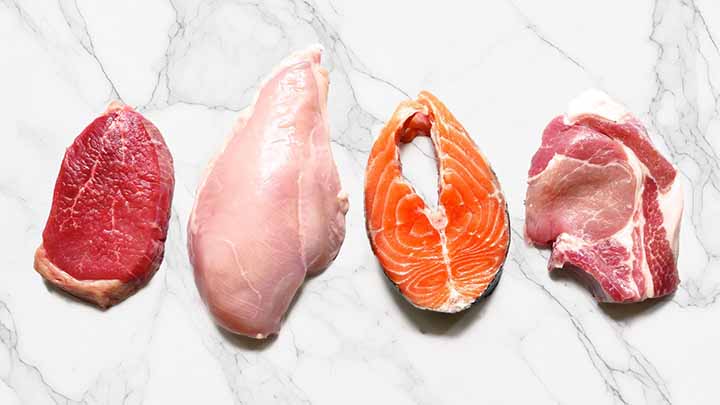The carnivore diet, often referred to as the all-meat diet, is a dietary regimen that emphasizes the consumption of animal products while excluding plant-based foods entirely. Advocates of the carnivore diet believe that it can lead to numerous health benefits, including weight loss, improved mental clarity, and reduced inflammation. As the name suggests, the foundation of this diet is built around a variety of meats, including beef, pork, chicken, and fish, alongside other animal-derived foods like eggs and dairy (for those who tolerate it).
A well-rounded carnivore diet food list typically includes fatty cuts of meat, organ meats rich in nutrients, and high-quality animal fats. While it may seem restrictive, the diet allows for a diverse range of flavors and textures, from juicy ribeyes to crispy bacon. Additionally, the simplicity of this diet makes meal prep easier, as it encourages straightforward cooking methods like grilling, roasting, or frying.
Whether you’re exploring the carnivore diet for health reasons or simply out of curiosity, understanding what foods to include is essential for success. In this guide, we’ll delve into a comprehensive food list to help you navigate your carnivore journey.

1. Introduction to the Carnivore Diet
The carnivore diet, often referred to as the “all-meat” diet, is a dietary regimen that focuses solely on animal-based foods while excluding all plant-based foods. It has gained popularity in recent years, touted for its potential health benefits, including weight loss, improved mental clarity, and reduced inflammation. Proponents of the diet argue that humans are primarily carnivorous and that a diet rich in animal products can lead to optimal health.
At its core, the carnivore diet is simple and straightforward. It consists primarily of meat, fish, eggs, and animal-derived products. By eliminating carbohydrates, sugars, and processed foods, adherents claim to experience enhanced energy levels, better digestion, and even improvements in autoimmune conditions. While the diet might seem restrictive at first glance, it allows for a variety of meats and animal products, providing ample options for those willing to embrace it.
As with any dietary change, it’s crucial to consult with a healthcare professional before embarking on the carnivore diet. This guide will delve into the various food categories that are staples of the carnivore diet, providing a comprehensive food list to help you navigate this unique eating plan.
2. Animal Proteins
Animal proteins form the backbone of the carnivore diet, providing essential amino acids that are vital for muscle growth, repair, and overall health. The primary sources of animal protein include various types of meat, each offering distinct flavors and nutritional benefits.
Beef
Beef is a cornerstone of the carnivore diet, renowned for its rich flavor and nutrient density. Cuts like ribeye, sirloin, and ground beef are popular choices. They are not only high in protein but also contain essential nutrients like iron, zinc, and B vitamins. Grass-fed beef is often preferred for its higher omega-3 fatty acid content and lower levels of saturated fat compared to grain-fed beef.
Pork
Pork is another excellent source of animal protein, offering a variety of cuts, including pork chops, tenderloin, and belly. It provides a unique flavor profile and is rich in thiamine, selenium, and niacin. Pork belly, in particular, is celebrated for its delicious fat content, making it a favorite for many carnivore diet enthusiasts.
Poultry
Chicken and turkey are lean sources of protein that can be incorporated into the carnivore diet. Chicken thighs and drumsticks, in particular, offer more flavor and fat than the breast, making them a preferred choice for those seeking richer options.
Lamb
Lamb is another delicious option that brings a different taste to the table. Cuts like leg of lamb and lamb chops are flavorful and provide a good amount of fat, making them a satisfying addition to your carnivore meal plan.
3. Fish and Seafood
Fish and seafood are integral components of the carnivore diet, providing not only protein but also healthy fats, particularly omega-3 fatty acids. These fatty acids are known for their anti-inflammatory properties and cardiovascular benefits.
Fatty Fish
Fatty fish, such as salmon, mackerel, sardines, and trout, are excellent choices for the carnivore diet. They are rich in omega-3s, which can help reduce inflammation and support brain health. Salmon, in particular, is also a great source of vitamin D and selenium.
Shellfish
Shellfish, including shrimp, crab, and lobster, are also suitable for the carnivore diet. They offer a unique flavor and are low in calories while being high in protein. Shellfish are also packed with essential nutrients, including zinc and vitamin B12.
Other Seafood
Other seafood options, such as cod, halibut, and haddock, can be included for variety. These lean fish provide protein without excess fat, making them a great addition to a balanced carnivore meal plan.
4. Animal Fats
In the carnivore diet, animal fats play a crucial role, serving as a primary energy source and contributing to satiety. Fats from animals provide flavor, texture, and essential fatty acids.
Types of Animal Fats
- Beef Tallow: Rendered from beef fat, tallow is ideal for cooking and frying due to its high smoke point. It adds a rich flavor to dishes and is a great alternative to vegetable oils.
- Lard: Derived from pork fat, lard is another excellent cooking fat that can be used in various recipes, including frying and baking. It is rich in monounsaturated fats, making it a healthier option compared to processed oils.
- Duck Fat: Known for its unique flavor, duck fat is perfect for roasting vegetables or frying potatoes. It has a higher smoke point and is rich in flavor.
- Butter and Ghee: While butter is technically a dairy product, it’s often included in the carnivore diet. Ghee, a clarified butter, is lactose-free and rich in beneficial fats, making it an excellent choice for cooking.
5. Dairy
Dairy can be included in the carnivore diet for those who tolerate it, providing additional protein, fat, and calcium. The choice of dairy products varies based on personal preference and dietary tolerance.
Cheese
Cheese is a popular addition to the carnivore diet, offering rich flavors and a variety of textures. Hard cheeses like cheddar, gouda, and parmesan are excellent choices, as they are lower in lactose compared to soft cheeses. Cream cheese and ricotta are also options, perfect for adding creaminess to dishes.
Heavy Cream
Heavy cream is another dairy staple that can be used in coffee, sauces, and desserts. It adds richness and flavor while providing a good source of fat.
Yogurt and Sour Cream
While some adherents choose to avoid these due to lactose content, full-fat yogurt and sour cream can be included in moderation for those who enjoy them. Opt for plain varieties to avoid added sugars.
6. Eggs
Eggs are a nutrient-dense food and an essential component of the carnivore diet. They are an excellent source of high-quality protein, healthy fats, and numerous vitamins and minerals, including vitamin B12, choline, and selenium.
Types of Eggs
- Chicken Eggs: The most commonly consumed eggs, chicken eggs are versatile and can be prepared in various ways, including boiled, scrambled, or fried.
- Duck Eggs: Duck eggs are larger and richer in flavor compared to chicken eggs. They are also higher in fat and protein, making them a nutritious option.
- Quail Eggs: Quail eggs are smaller and can be enjoyed as a delicacy. They are packed with flavor and nutrients, making them a fun addition to a carnivore meal.
7. Organ Meats
Organ meats are often considered a superfood on the carnivore diet due to their nutrient density. They are rich in vitamins and minerals, often in higher concentrations than muscle meats.
Types of Organ Meats
- Liver: Often regarded as the most nutrient-dense organ meat, liver is packed with vitamin A, iron, and B vitamins. It can be enjoyed cooked or as liver pâté.
- Kidneys: Rich in nutrients, kidneys can be grilled or sautéed for a flavorful dish.
- Heart: The heart is a lean source of protein and is high in coenzyme Q10, which is beneficial for heart health. It can be cooked similarly to muscle meats.
8. Bone Broth
Bone broth is a nourishing addition to the carnivore diet, offering a variety of health benefits. It is made by simmering animal bones (usually beef or chicken) with water and vinegar for an extended period, extracting nutrients and minerals.
Benefits of Bone Broth
- Collagen and Gelatin: Bone broth is rich in collagen and gelatin, which are beneficial for joint health and skin elasticity.
- Electrolytes: Bone broth contains essential electrolytes like sodium, potassium, and magnesium, making it a hydrating option.
- Gut Health: The gelatin in bone broth can help soothe the digestive tract and support gut health.
9. Seasonings and Condiments
While the carnivore diet primarily focuses on animal products, seasonings and condiments can enhance the flavor of your meals without straying from the diet’s principles.
Acceptable Seasonings
- Salt: High-quality sea salt or Himalayan pink salt is essential for enhancing flavor and replenishing electrolytes.
- Pepper: Black pepper can add warmth and depth to dishes without any carbohydrates.
- Herbs: Fresh or dried herbs like rosemary, thyme, and oregano can be used sparingly to enhance flavors.
- Mustard: Sugar-free mustard can be included as a condiment, adding zest to meats.
10. Foods to Avoid
To adhere strictly to the carnivore diet, certain foods must be avoided to achieve the best results. These foods primarily consist of plant-based products and processed foods.
Foods to Avoid
- Fruits and Vegetables: All fruits and vegetables, including grains and legumes, should be avoided as they contain carbohydrates and fiber.
- Processed Foods: Highly processed foods, including sugars, refined oils, and artificial additives, are not part of the carnivore diet.
- Beverages: Most beverages other than water, bone broth, and black coffee or tea (without additives) should be avoided.
11. Sample Meal Ideas
Here are some sample meal ideas to inspire your carnivore diet journey:
Breakfast
- Scrambled Eggs with Bacon: Start your day with a hearty meal of scrambled eggs cooked in bacon fat, accompanied by crispy bacon.
Lunch
- Grilled Ribeye Steak: Enjoy a juicy ribeye steak seasoned with salt and pepper, served with a side of bone broth.
Dinner
- Roasted Chicken Thighs: Roast chicken thighs with skin for a flavorful and satisfying dinner.
Snacks
- Hard-Boiled Eggs: Prepare hard-boiled eggs for a quick and nutritious snack.
- **Beef Jer




Leave a Reply